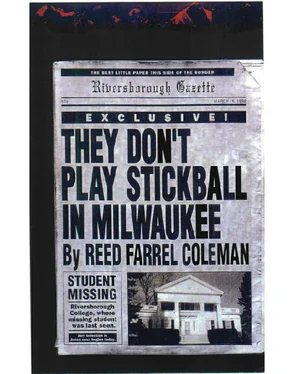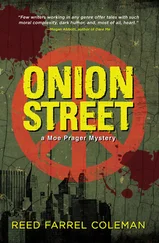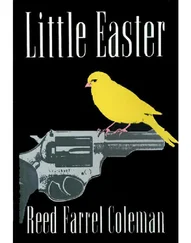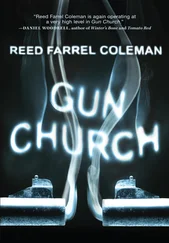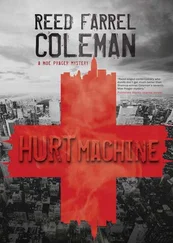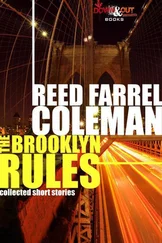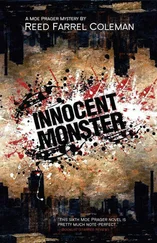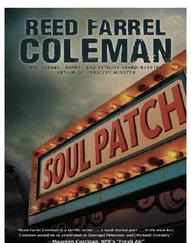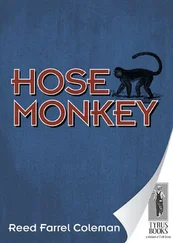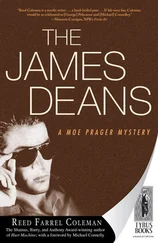Reed Coleman - They Don't Play Stickball in Milwaukee
Здесь есть возможность читать онлайн «Reed Coleman - They Don't Play Stickball in Milwaukee» весь текст электронной книги совершенно бесплатно (целиком полную версию без сокращений). В некоторых случаях можно слушать аудио, скачать через торрент в формате fb2 и присутствует краткое содержание. Год выпуска: 0101, ISBN: 0101, Издательство: The Permanent Press, Жанр: Криминальный детектив, на английском языке. Описание произведения, (предисловие) а так же отзывы посетителей доступны на портале библиотеки ЛибКат.
- Название:They Don't Play Stickball in Milwaukee
- Автор:
- Издательство:The Permanent Press
- Жанр:
- Год:0101
- ISBN:1579622984
- Рейтинг книги:5 / 5. Голосов: 1
-
Избранное:Добавить в избранное
- Отзывы:
-
Ваша оценка:
- 100
- 1
- 2
- 3
- 4
- 5
They Don't Play Stickball in Milwaukee: краткое содержание, описание и аннотация
Предлагаем к чтению аннотацию, описание, краткое содержание или предисловие (зависит от того, что написал сам автор книги «They Don't Play Stickball in Milwaukee»). Если вы не нашли необходимую информацию о книге — напишите в комментариях, мы постараемся отыскать её.
They Don't Play Stickball in Milwaukee — читать онлайн бесплатно полную книгу (весь текст) целиком
Ниже представлен текст книги, разбитый по страницам. Система сохранения места последней прочитанной страницы, позволяет с удобством читать онлайн бесплатно книгу «They Don't Play Stickball in Milwaukee», без необходимости каждый раз заново искать на чём Вы остановились. Поставьте закладку, и сможете в любой момент перейти на страницу, на которой закончили чтение.
Интервал:
Закладка:
John was lifeless behind the bar. There would be no good-byes. The four of us, Fazio and Hurley, Jeffrey and myself, formed a circle around his body. Glass crunched under our feet. More out of reflex than hope, Fazio knelt down and touched his fingers to Johnny’s bloodied throat. There was nothing to feel but the heat running out of him.
“I’ll go make the call,” Hurley volunteered.
Then Fazio said something only survivors say: “It’s better this way.”
He must have seen the confusion in my eyes and answered my question before I asked it.
“Liver cancer,” he said, “and it was spreading. He wanted to tell you, but with your dad, the kid, and the girl, he just never had the heart.”
I guess Fazio was right. It was better this way. John was haunted by his own father’s death from cancer.
Pointing at Angel, Jeffrey asked: “Who was he?”
“Angel Hernandez,” Fazio answered.
“Hernandez!” The name caught in my throat.
“That’s right, Klein, the kidnapper’s brother,” Fazio confirmed. “MacClough told me Angel had sworn to get even for his little brother.”
Sirens replaced the laughter of giddy poltergeists as the soundtrack for the evening. Tires screeched. The Scupper was crowded once again. John always liked it when the Scupper was crowded.
We passed the school where children played
Their lessons scarcely done;
We passed the fields of gazing grain,
We passed the setting sun.
— Emily Dickinson
Epilogue
Different Shades
I had met many of John’s friends in the time we’d known one another. But I never realized what a small percentage that was until the funeral. In a way it was a shame that I met some of the faces I had only known through John’s stories. The reality could never match the broad brush of his words.
The funeral was held at St. Mark’s, MacClough’s old Brooklyn church and parochial school. A member of the Emerald Society played the bagpipes from the balcony and one of his old schoolyard chums sang “Danny Boy.” Even the priest could not hide his tears. Half of Sound Hill was there, even some of the upper-crust summer vacationers took the time to say their good-byes. I had no idea where Angel Hernandez was buried.
Walking my share of his coffin down the center aisle of the church, my arm ached as if it was carrying three bodies. My father’s death, Kira’s, and now Johnny’s were pulling me down. Too much of my universe had disappeared all at once. I thought my arm would float up after we slid John’s coffin into the hearse.
Outside the church, there was the usual confusion about who was riding in what car and with whom. I had to bum a ride for Shelley Stickman, who was so worried about where I was going to find a new technical adviser that he had neglected to make his own arrangements. I grabbed Larry Feld and asked that he ride with me. Larry seemed surprised by the invitation, but didn’t put up a fight. I pointed him to the car and told him to wait for me there.
I found Detective Fazio lighting up a Kent at the side of the church steps. We shook hands. He said all the things people say. He offered me a cigarette. I took one.
“I hear MacClough left you the bar,” Fazio said, holding his lighter to the tip of my cigarette.
“Me and his brother.” I handed him an envelope. “Here. I found this in MacClough’s papers. It’s addressed to you. Open it up.”
“I don’t have to.”
And before I could ask why not, he held his lighter to the corner of the envelope. He held it between his fingers until it was fully ablaze and then dropped it to the sidewalk. We watched the ball of ashes evaporate in the wind.
Checking the tips of his fingers for burns, Fazio said: “I guess you’re curious.”
“Always.”
“It was MacClough’s sworn affidavit about the kidnapping and the coverup. MacClough promised it to me when he came to me for help.”
“Why’d you destroy it?” I was puzzled. “You could have used it to prove you were right back then, that you were the victim of a cover-up. You could have sued the city, the department.”
“Statute of limitations,” he said.
“Since when are you a lawyer?”
“Not the state’s limitations. My own.”
Car horns cried out as Cathy Hurley found us.
“There you two are. Everybody’s waiting for you, Dylan.”
“I’m coming.” I smiled at her and turned to go.
“Hey, Klein,” Fazio called to me. “If you need a barman, let me know. I’m pretty good with a beer pull.”
“What about the Castle-on-Hudson PD?” I wondered.
“No more make-believe for me,” he said. “Being around MacClough reminded me what it was like to be around real cops.”
“He would have appreciated that. Thanks.”
I led the procession in John’s fully restored ‘66 Thunderbird. I guess in his way John was trying to let me know he was dying. But when you assume a man will live forever, you don’t notice even the most obvious hints. Or maybe my father’s long crawl to death had blinded me. It was just another thing I would never know.
Rather than heading directly to the cemetery, I circled the block so that MacClough could pass the basketball courts behind the church one final time. Some kids were playing half-court and couldn’t be bothered to stop to contemplate mortality. Although I did not know him then, I could picture John as a kid, not stopping to look. He wouldn’t’ve seen the value in it. Everybody was going to die someday.
Larry Feld just sat quietly, taking it all in. St. Mark’s was, after all, on the border of our old neighborhood. He frowned as we passed back in front of the church. I don’t suppose Larry ever understood my affection for anyone who wasn’t Jewish. As a child raised to believe in a world that consisted only of victims and victimizers, Larry had a clear sense of which role Jews historically played. Sure, most of his clients were gentiles, but that just felt like payback to Larry. It gave him a sense of superiority, power. I think Larry saw my friendships and dealings with non Jews as vaguely treasonous. The truth was that Larry saw my affection for anyone else as tantamount to betrayal.
“It’s freezing in here,” Larry moaned as we sped down the Belt Parkway with the T-Bird’s windows wide open.
“Is it?”
“So, why’d you ask me to ride with you?”
“I wanted to thank you for your help,” I said.
“Frankly, Dylan, I would have preferred a nice bottle of Laurent-Perrier 1991. Riding in the lead car of a funeral procession for a guy I didn’t particularly care for isn’t my idea of thanks.”
“It’s the best I could do on short notice. Besides,” I admitted, “I wanted to talk to you.”
“About what, your murderous friend back there in the hearse?”
“It was suicide,” I shouted.
“Murder comes in different shades, Dylan. If you wanna call it suicide, go right ahead. There’s no one left to argue the point.”
“Okay, Larry, let’s drop it. I just wanted you to ride with me.”
“Why?”
“Because, for all your goddamn faults, you’re my oldest friend.”
I caught him smiling out of the corner of my eye.
“I have faults?” he said.
The car was silent again but for the sound of the wind. Larry didn’t even complain about the cold. Despite his protestations to the contrary, it meant a lot to Larry that I’d asked him to ride with me. I knew John would have approved. Friendship meant everything to Johnny MacClough.
In the rearview mirror I watched the long line of headlights snake into the cemetery. Now John might finally rest in peace. I didn’t know that I was likely to, not for a while, anyway.
Интервал:
Закладка:
Похожие книги на «They Don't Play Stickball in Milwaukee»
Представляем Вашему вниманию похожие книги на «They Don't Play Stickball in Milwaukee» списком для выбора. Мы отобрали схожую по названию и смыслу литературу в надежде предоставить читателям больше вариантов отыскать новые, интересные, ещё непрочитанные произведения.
Обсуждение, отзывы о книге «They Don't Play Stickball in Milwaukee» и просто собственные мнения читателей. Оставьте ваши комментарии, напишите, что Вы думаете о произведении, его смысле или главных героях. Укажите что конкретно понравилось, а что нет, и почему Вы так считаете.
